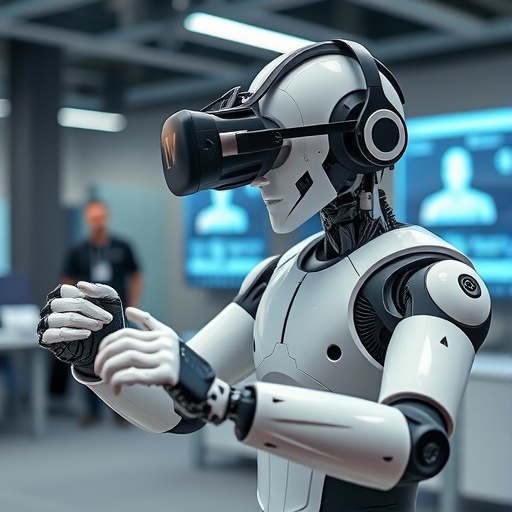In an era where automation is progressively reshaping industrial landscapes, the recycling industry stands at the cusp of a transformative leap. Robots are increasingly integral to dismantling and recycling electronic waste, a process essential for salvaging valuable components and materials from obsolete devices. However, integrating robots into this sector introduces new challenges, particularly in effectively training human operators to collaborate seamlessly with robotic systems. This is where the University of Georgia’s pioneering research presents a groundbreaking solution: a virtual reality (VR) platform designed to revolutionize human–robot disassembly training.
Robotic assistance in disassembly is crucial because unlike assembly tasks, disassembly lacks a standardized, linear sequence. Disassembly operations demand adaptive strategies since components often vary in condition and configuration due to wear or damage. Beiwen Li, associate professor at UGA’s College of Engineering and lead author of the study, explains this complexity succinctly, emphasizing that disassembly cannot simply be reversed assembly. Therefore, innovative training methods are necessary to prepare human workers to navigate this unpredictability while ensuring efficiency and safety.
The research team developed VR Co-Lab, an immersive virtual workspace that simulates real-world disassembly environments. This digital platform allows users to practice disassembling electronic devices—specifically hard drives—with robotic assistance before engaging with physical equipment. By donning a VR headset, trainees enter a lifelike virtual workshop populated with all the tools, machinery, and a robotic arm essential for performing precise disassembly tasks. The realistic simulation not only replicates the visual aspects but also captures nuanced interactions, fostering an intuitive understanding of task sequencing.
One of the core advantages of VR Co-Lab is its ability to facilitate hands-on training without risking damage to expensive or delicate components. The virtual setting permits repeated practice of complex procedures, enabling trainees to develop muscle memory for intricate tasks such as unscrewing tiny bolts or handling fragile electronic parts. Meanwhile, the robot takes charge of larger or more cumbersome components, illustrating effective human–robot collaboration. Throughout the training, the system continuously monitors user performance, gauging completion times and errors, thus providing quantitative feedback to optimize learning outcomes.
Beyond skill acquisition, the platform prioritizes user safety by integrating advanced body tracking technology. Implemented using the Meta Quest Pro’s sophisticated cameras, the system maps the trainee’s upper body movements, including the wrists, elbows, shoulders, and torso. This real-time tracking informs the robot’s motion planning algorithms, enabling the robotic arm to respond adaptively to the user’s position and actions. This synergy ensures avoidance of collisions, drastically reducing the risk of injury while enhancing the fluidity of joint human–robot operations.
Moreover, VR Co-Lab functions as a proactive safety training tool by alerting users to potential hazards during disassembly. The system can simulate emergency scenarios, such as inadvertent proximity to the robot arm, allowing users to develop situational awareness and learn best practices to mitigate risk. Additionally, the platform analyzes the pace at which tasks are performed, offering insights into how quickly robotic assistance can operate without overwhelming human partners, striking a critical balance between efficiency and ergonomic considerations.
This innovative VR training methodology significantly shortens the traditionally long and complicated learning curves associated with robotic disassembly tasks. Conventional training often depends on voluminous technical manuals and extended hands-on mentoring, which can be resource-intensive and inconsistent across trainees. By contrast, the immersive virtual environment provides an intuitive, engaging learning experience that can be standardized and scaled across facilities, accelerating workforce readiness and fostering greater confidence among workers.
The implications of VR Co-Lab extend well beyond training novices. As the recycling industry grapples with labor shortages and the increasing complexity of electronic waste, a system that harmonizes human dexterity with robotic power promises to enhance operational throughput. Robots can automate repetitive or dangerous steps, while humans focus on fine manipulation and decision-making, thus harnessing the strengths of both to maximize productivity and sustainability in recycling processes.
Looking ahead, the research team envisions expanding the VR platform’s capabilities to accommodate a wider range of recycling tasks and user skill levels. Planned comprehensive user testing aims to refine the interface, adapt training modules for diverse equipment, and validate the system’s effectiveness across variable industrial contexts. Such efforts will be essential to embed VR Co-Lab as a core training tool, empowering the workforce amidst evolving automation landscapes.
Funded by the National Science Foundation and published in the peer-reviewed journal Machines, this study exemplifies the potential of multidisciplinary collaboration. Co-authors from Iowa State University and Texas A&M University contributed expertise in robotics and human-computer interaction to ensure the platform not only advances technical proficiency but also enhances workplace safety and ergonomics.
In summary, UGA’s VR Co-Lab represents a significant innovation in industrial training paradigms. By combining immersive virtual reality with intelligent robotics and precise motion tracking, it crafts a future-ready solution addressing the nuanced demands of human–robot cooperation in recycling disassembly. As electronics continue to proliferate globally, effective recycling becomes paramount, and technologies like VR Co-Lab will undoubtedly play a pivotal role in scaling sustainable practices while safeguarding human workers.
Subject of Research: Human–Robot Collaboration and Training in Electronic Waste Disassembly Using Virtual Reality
Article Title: VR Co-Lab: A Virtual Reality Platform for Human–Robot Disassembly Training and Synthetic Data Generation
News Publication Date: 17-Mar-2025
Web References:
https://www.mdpi.com/2075-1702/13/3/239
http://dx.doi.org/10.3390/machines13030239
References:
Li, B., Maddipatla, Y., Tian, S., Liang, X., & Zheng, M. (2025). VR Co-Lab: A Virtual Reality Platform for Human–Robot Disassembly Training and Synthetic Data Generation. Machines, 13(3), Article 239. https://doi.org/10.3390/machines13030239
Keywords: Robotics, Human–Robot Interaction, User Interfaces, Industrial Sectors, Waste Management




